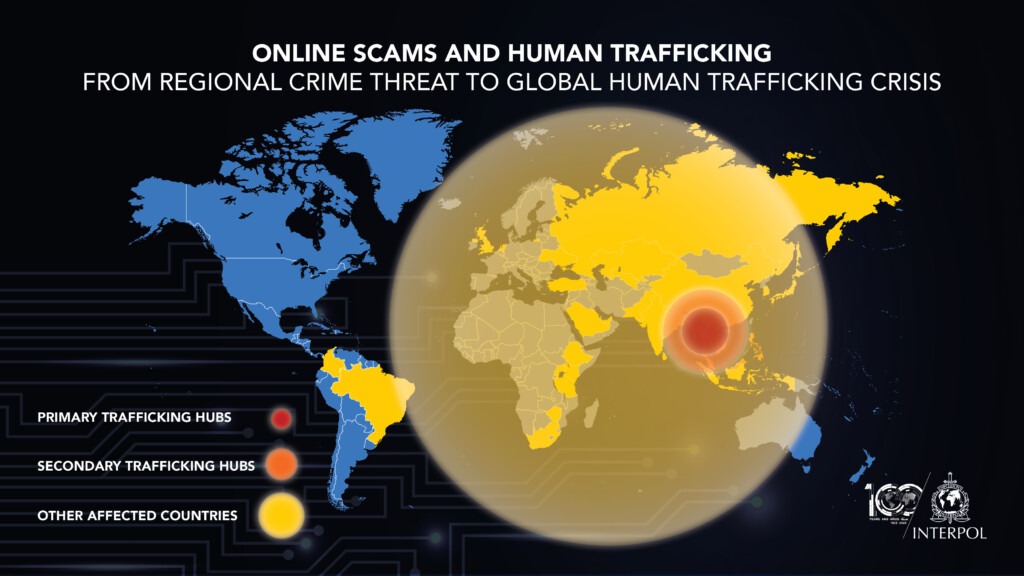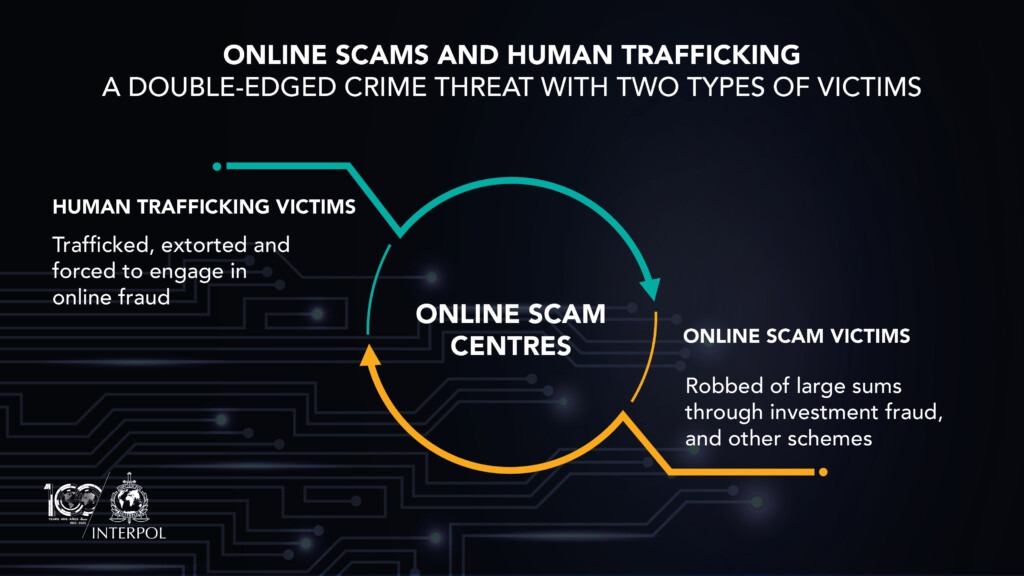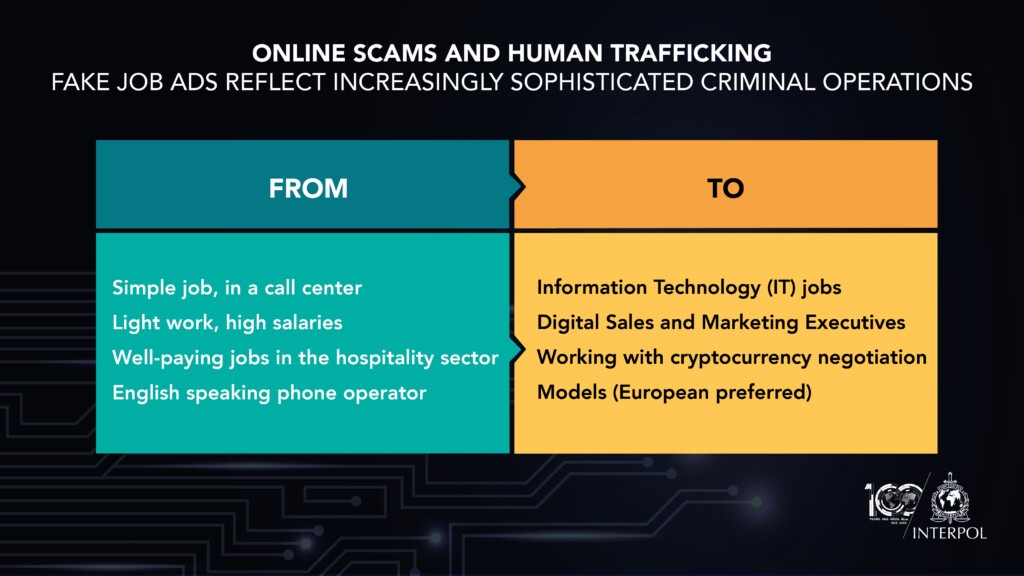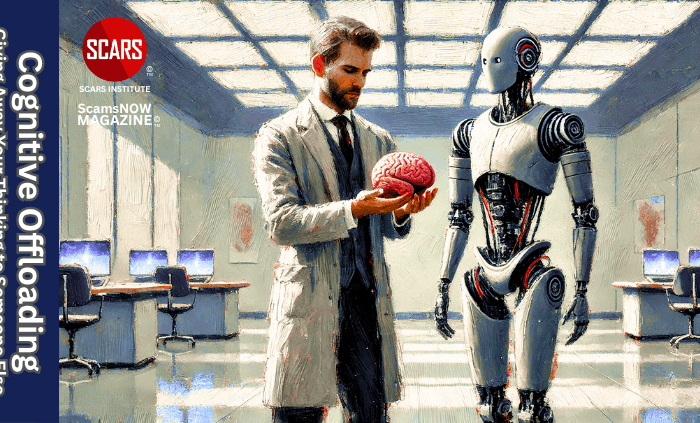INTERPOL Issues Global Warning On Human Trafficking-Fueled Fraud
By INTERPOL
The NEW Scheme, Where Victims Are Trafficked To Work In Online Scam Centres, Has Shifted From A Regional Crime Trend To A Global Threat.
INTERPOL HQ SINGAPORE: For the past several years, INTERPOL has been closely observing a growing crime phenomenon: large-scale human trafficking where victims are lured through fake job ads to online scam centres and forced to commit cyber-enabled financial crime on an industrial scale.
The crime trend, which has seen tens of thousands trafficked in Southeast Asia and many more defrauded around the world, has attracted media attention and prompted government and civil society responses.
Nevertheless, new INTERPOL research warns that the Modus Operandi (MO) is escalating rapidly, taking on a new global dimension, and that the crime trend is likely much more entrenched than previously thought. The Organization has issued an Orange Notice to its membership on the trend – a global warning regarding a serious and imminent threat to public safety.
Initially, online scam centres were concentrated in Cambodia, with further trafficking hubs later identified in Laos and Myanmar. Today, trafficking hubs have been identified in at least four more Asian countries, and there is evidence that the MO is being replicated in other regions such as West Africa, where cyber-enabled financial crime is already prevalent.
Likewise, the geographical diversity of both sets of victims has also dramatically increased. While initial human trafficking victims were Chinese-speaking, drawn from China, Malaysia, Thailand or Singapore, victims have since been trafficked to the region from as far afield as South America, East Africa and Western Europe.
“What began as a regional crime threat has become a global human trafficking crisis,” said Jürgen Stock, INTERPOL Secretary General.
“Just about anyone in the world could fall victim to either the human trafficking or the online scams carried out through these criminal hubs. Much stronger international police cooperation is needed to stop this crime trend from spreading further.”
Double-edged Crime Threat
The reports first emerged throughout 2021. Criminal groups posted false promises of lucrative job opportunities on social networks and recruitment sites, only to kidnap and detain the unsuspecting applicants in inhuman living conditions while engaging the victims in forced criminality, mainly online fraud.
The online scam centres represent a double-edged crime threat, exploiting two sets of victims. On the one side, victims drawn into the human trafficking schemes are subject to forced labour and often extortion through a type of debt bondage, as well as beatings, sexual exploitation, torture, rape and even alleged organ harvesting in some cases.
On the other side, the trafficked workers are used to perpetrate a range of online fraud on a second set of victims, increasingly scattered around the world. The schemes include investment fraud, romance scams and frauds linked to cryptocurrency investing and online gambling.
NTERPOL’s March 2022 Operation Storm Makers, targeting human trafficking and migrant smuggling, resulted in further information on this growing trend. The operation led INTERPOL to issue a Purple Notice – a global police alert detailing new criminal modi operandi – entitled ‘Social media recruitment for forced labour in Southeast Asia”.
The scale of the trafficking, and its particular nexus with cyber fraud, have been unprecedented, exploiting specific vulnerabilities of the post-pandemic landscape.
COVID-19 widened the victim pools on both sides of the online scam centre trend. Online fraud has increased sharply as digitalization rates were pushed upwards during pandemic lockdowns, forcing most professional and personal activities performed almost exclusively online.
At the same time, the pandemic rendered many workers jobless and increasingly desperate for professional opportunities.
Global Footprint
As the diversity of the trafficking victims has increased, so has the geographical diversity of online scam victims targeted, as the former bring in new languages and cultural awareness that can be exploited by criminal operators. Online fraud victims targeted by the centres were initially mainly of Chinese origin, yet are increasingly located in North America, Europe and other parts of Asia.
In parallel, the sophistication of the scam centres has also increased. An analysis of the job titles mentioned in fake work ads shows an evolution from basic requirements – “simple job in a call centre”; “phone operator” – to more skilled profiles, such as information technology workers or “digital sales executives”.
Recent developments in artificial intelligence and large language models like ChatGPT are also reportedly being leveraged by the online scam centres. At the same time, language translation software is used to target victims in countries not represented by trafficked workers.
Intelligence Exchange
To address this increasingly global threat, INTERPOL is calling for greater intelligence exchange between law enforcement, non-governmental organizations, financial intelligence units and relevant private sector companies to support the rescue of trafficking victims and dismantle the money laundering activities that facilitate these activities.
“In the past year, INTERPOL has supported member countries in cases relating to hundreds of human trafficking victims,” said Isaac Espinosa, Acting Coordinator of INTERPOL’s Human Trafficking and Migrant Smuggling unit.
“Thousands of people around the world continue to fall victim to these organized crime groups and a new piece of intelligence – on trafficking routes, financial transfers or criminal techniques – could prevent an individual from losing their life savings or rescue another from horrific exploitation.”
-/ 30 /-
What do you think about this?
Please share your thoughts in a comment below!
More ScamsNOW.com Articles
-/ 30 /-
What do you think about this?
Please share your thoughts in a comment above!
SCARS LINKS: AgainstScams.org RomanceScamsNOW.com ContraEstafas.org ScammerPhotos.com Anyscam.com ScamsNOW.com
reporting.AgainstScams.org support.AgainstScams.org membership.AgainstScams.org donate.AgainstScams.org shop.AgainstScams.org
youtube.AgainstScams.org linkedin.AgainstScams.org facebook.AgainstScams.org
ARTICLE RATING
TABLE OF CONTENTS
CATEGORIES
MOST POPULAR COMMENTED ARTICLES
POPULAR ARTICLES
U.S. & Canada Suicide Lifeline 988
![NavyLogo@4x-81[1]](https://scamsnow.com/wp-content/uploads/2025/04/NavyLogo@4x-811.png)
ARTICLE META
WHAT PEOPLE ARE TALKING ABOUT LATEST SITE COMMENTS
See Comments for this Article at the Bottom of the Page
on Substance Abuse Susceptibility And Scam Victims – 2024: “It is understandable how some would feel that alcohol or substance abuse would be helpful in handling their feelings after…” Jul 1, 20:36
on Scam Victims Use Work To Avoid Healing: “The last 6 years have been the most difficult of my life. The pandemic, having both parents in the hospital…” Jun 29, 18:38
on Entitlement Mentality And How Scam Victims Often Lose Their Path To Recovery – 2024: “Thank you for this discussion of entitlement. I can see from the descriptions listed that I have not felt entitlement.…” Jun 29, 18:22
on Samurai Wisdom and Rituals for Clearing the Mind After Scam Trauma – 2025 – [VIDEOS]: “A great guide on how to move forward in our recovery process with a calm mind, cleansed on an ongoing…” Jun 28, 07:34
on Delayed Gratification and Patience in Scam Victim Recovery – 2025 – [VIDEOS]: “We want to recover quickly and… we make new mistakes. How not to speed up the recovery process, how to…” Jun 28, 06:41
on The Unique Injury Of Betrayal Trauma On Scam Victims – 2024: “Primarily because you did not see it coming” Jun 27, 23:57
on Changes In A Scam Victim’s Life: “I really detest the way my trust in others has been affected by the scamming I went through. I used…” Jun 27, 14:47
on The Unique Injury Of Betrayal Trauma On Scam Victims – 2024: “Betrayal Trauma is the worst feeling ever. Why does it seem so much worse when a scammer does that to…” Jun 27, 14:34
on EMDR Therapy For Scam Victims’ Trauma – A Part Of The Recovery Process For Many – 2024: “Very comprehensive article explaining all aspects of EMDR. I’d only heard of it before and now I have a much…” Jun 26, 19:01
on Forgiving Yourself After Surviving a Romance or Investment Scam – 2025: “Thank you for this valuable article. Self-forgiveness was for me the biggest step that led to my recovery. That also…” Jun 26, 17:28
on Counseling And Your Native Language: “These points make perfect sense. I can’t imagine trying to express complex emotions in a second language. I realize many…” Jun 26, 16:05
on Thought-Terminating Cliches – How What You and Others Say Stops Critical Thinking and Recovery for Scam Victims – 2025: “I didn’t realize that these “innocent phrases” clichés ending thoughts, can have such effect / negative -inhibiting / on our…” Jun 26, 14:48
on Scam Victim Resistance In Support Groups Therapy Or Counseling Can Destroy Opportunities For Recovery – 2024: “Working with either a support group or therapist to me means a self commitment to actively participating in the therapy.…” Jun 24, 21:01
on ‘I Just Want To Forget It’ – Denial & Avoidance Are Natural But Will Not Help Scam Victims On Their Path To Recovery From Scams – 2024: “My financial loss, the shock and betrayal of the crime ending all combined to fray my nerves and spend hours…” Jun 24, 20:10
on You Hate Being Told What To Do? How Your Rebellious Mentality Can Sabotage Your Recovery – 2025: “I am a bit of a rebel, and the moment someone tells me to do something, worse, does it even…” Jun 24, 15:04
on You Hate Being Told What To Do? How Your Rebellious Mentality Can Sabotage Your Recovery – 2025: “You are very welcome” Jun 24, 03:01
on You Hate Being Told What To Do? How Your Rebellious Mentality Can Sabotage Your Recovery – 2025: “This is a great article, which makes perfect sense as to why anyone would resist the help offered to them.…” Jun 23, 20:01
on Scam Victims’ Responsibilities – 2021 [Updated 2025]: “Thank you for this article. As I continue my journey, I focus on the here and now and let the…” Jun 21, 16:26
on Scam Victims Avoid Or Escape The Aftermath Of Scams – How Denial And Distraction Avoid Confronting Reality – 2024: “In the earliest days after my crime I felt powerless, helpless and weak. I had been through so much in…” Jun 21, 14:46
Important Information for New Scam Victims
Please visit www.ScamVictimsSupport.org – a SCARS Website for New Scam Victims & Sextortion Victims
SCARS Institute now offers a free recovery program at www.SCARSeducation.org
Please visit www.ScamPsychology.org – to more fully understand the psychological concepts involved in scams and scam victim recovery
If you are looking for local trauma counselors, please visit counseling.AgainstScams.org
If you need to speak with someone now, you can dial 988 or find phone numbers for crisis hotlines all around the world here: www.opencounseling.com/suicide-hotlines
Statement About Victim Blaming
Some of our articles discuss various aspects of victims. This is both about better understanding victims (the science of victimology) and their behaviors and psychology. This helps us to educate victims/survivors about why these crimes happened and not to blame themselves, better develop recovery programs, and help victims avoid scams in the future. At times, this may sound like blaming the victim, but it does not blame scam victims; we are simply explaining the hows and whys of the experience victims have.
These articles, about the Psychology of Scams or Victim Psychology – meaning that all humans have psychological or cognitive characteristics in common that can either be exploited or work against us – help us all to understand the unique challenges victims face before, during, and after scams, fraud, or cybercrimes. These sometimes talk about some of the vulnerabilities the scammers exploit. Victims rarely have control of them or are even aware of them, until something like a scam happens, and then they can learn how their mind works and how to overcome these mechanisms.
Articles like these help victims and others understand these processes and how to help prevent them from being exploited again or to help them recover more easily by understanding their post-scam behaviors. Learn more about the Psychology of Scams at www.ScamPsychology.org
SCARS INSTITUTE RESOURCES:
If You Have Been Victimized By A Scam Or Cybercrime
♦ If you are a victim of scams, go to www.ScamVictimsSupport.org for real knowledge and help
♦ Enroll in SCARS Scam Survivor’s School now at www.SCARSeducation.org
♦ To report criminals, visit https://reporting.AgainstScams.org – we will NEVER give your data to money recovery companies like some do!
♦ Follow us and find our podcasts, webinars, and helpful videos on YouTube: https://www.youtube.com/@RomancescamsNowcom
♦ Learn about the Psychology of Scams at www.ScamPsychology.org
♦ Dig deeper into the reality of scams, fraud, and cybercrime at www.ScamsNOW.com and www.RomanceScamsNOW.com
♦ Scam Survivor’s Stories: www.ScamSurvivorStories.org
♦ For Scam Victim Advocates visit www.ScamVictimsAdvocates.org
♦ See more scammer photos on www.ScammerPhotos.com
You can also find the SCARS Institute on Facebook, Instagram, X, LinkedIn, and TruthSocial
Psychology Disclaimer:
All articles about psychology and the human brain on this website are for information & education only
The information provided in this and other SCARS articles are intended for educational and self-help purposes only and should not be construed as a substitute for professional therapy or counseling.
Note about Mindfulness: Mindfulness practices have the potential to create psychological distress for some individuals. Please consult a mental health professional or experienced meditation instructor for guidance should you encounter difficulties.
While any self-help techniques outlined herein may be beneficial for scam victims seeking to recover from their experience and move towards recovery, it is important to consult with a qualified mental health professional before initiating any course of action. Each individual’s experience and needs are unique, and what works for one person may not be suitable for another.
Additionally, any approach may not be appropriate for individuals with certain pre-existing mental health conditions or trauma histories. It is advisable to seek guidance from a licensed therapist or counselor who can provide personalized support, guidance, and treatment tailored to your specific needs.
If you are experiencing significant distress or emotional difficulties related to a scam or other traumatic event, please consult your doctor or mental health provider for appropriate care and support.
Also read our SCARS Institute Statement about Professional Care for Scam Victims – click here
If you are in crisis, feeling desperate, or in despair, please call 988 or your local crisis hotline.
More ScamsNOW.com Articles
A Question of Trust
At the SCARS Institute, we invite you to do your own research on the topics we speak about and publish. Our team investigates the subject being discussed, especially when it comes to understanding the scam victims-survivors’ experience. You can do Google searches, but in many cases, you will have to wade through scientific papers and studies. However, remember that biases and perspectives matter and influence the outcome. Regardless, we encourage you to explore these topics as thoroughly as you can for your own awareness.

















![scars-institute[1]](https://scamsnow.com/wp-content/uploads/2025/04/scars-institute1.png)
![niprc1.png1_-150×1501-1[1]](https://scamsnow.com/wp-content/uploads/2025/04/niprc1.png1_-150x1501-11.webp)
